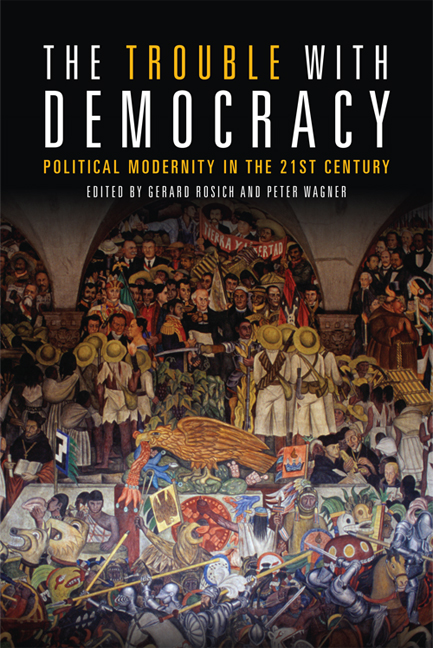Book contents
- Frontmatter
- Contents
- Acknowledgements
- List of Contributors
- 1 Introduction: Re-Interpreting Democracy for Our Time
- 2 Autonomy in and between Polities: Democracy and the Need for Collective Political Selves
- 3 Rethinking ‘Modern’ Democracy: Political Modernity and Constituent Power
- 4 Democratic Surplus and Democracy-in-Failing: On Ancient and Modern Self-Cancellation of Democracy
- 5 Setbacks of Women's Emancipation (Condition, Consequence, Measure and Ruse)
- 6 Political Modernity, Democracy and State–Society Relations in Latin America: A New Socio-Historical Problématique?
- 7 Communitarian Cosmopolitanism: Argentina's Recuperated Factories, Neoliberal Globalisation and Democratic Citizenship. An Arendtian Perspective
- 8 Middle-Classing in Roodepoort: Unexpected Sites of Post-Apartheid ‘Community’
- 9 Democracy and Capitalism in Europe, Brazil and South Africa
- 10 From Realism to Activism: A Critique of Resignation in Political Theory
- 11 The World as We Find It: A Suggestion for a Democratic Theory for Our Times
- 12 Epilogue: Democracy as Capacity for Self-Transformation
- Index
12 - Epilogue: Democracy as Capacity for Self-Transformation
Published online by Cambridge University Press: 05 September 2016
- Frontmatter
- Contents
- Acknowledgements
- List of Contributors
- 1 Introduction: Re-Interpreting Democracy for Our Time
- 2 Autonomy in and between Polities: Democracy and the Need for Collective Political Selves
- 3 Rethinking ‘Modern’ Democracy: Political Modernity and Constituent Power
- 4 Democratic Surplus and Democracy-in-Failing: On Ancient and Modern Self-Cancellation of Democracy
- 5 Setbacks of Women's Emancipation (Condition, Consequence, Measure and Ruse)
- 6 Political Modernity, Democracy and State–Society Relations in Latin America: A New Socio-Historical Problématique?
- 7 Communitarian Cosmopolitanism: Argentina's Recuperated Factories, Neoliberal Globalisation and Democratic Citizenship. An Arendtian Perspective
- 8 Middle-Classing in Roodepoort: Unexpected Sites of Post-Apartheid ‘Community’
- 9 Democracy and Capitalism in Europe, Brazil and South Africa
- 10 From Realism to Activism: A Critique of Resignation in Political Theory
- 11 The World as We Find It: A Suggestion for a Democratic Theory for Our Times
- 12 Epilogue: Democracy as Capacity for Self-Transformation
- Index
Summary
Democracy is the hegemonic political form today, and at the same time it is often diagnosed as being in profound trouble, even as having reached the end of its possibilities. To arrive at a more adequate understanding of the current state of democracy, in the light of the observations and reflections of the preceding chapters, we proceed in three steps. First, we briefly portray the three dominant views of democracy as underestimating historicity in favour of conceptuality. Secondly, as an alternative, we try to identify the key tensions with the concept of democracy that are actualised in different ways under changing historical conditions. On this basis, finally, we outline the main reasons for the current trouble with democracy.
Three views of current democracy
According to the affirmative narrative, democracy is in its best state ever. After a long history of breakthroughs and setbacks, the democratic imaginary has finally imposed itself all over the world. A wide range of democratic institutions exists with considerable popular support, or at least consent, and there is no other political form that competes against it. At this moment, some contemporary thinkers and politicians do not hesitate to close the historical gap between reality and ideality, which had allowed for unlimited political progress to happen: nowadays reality and ideality are finally matching. Therefore, any critique of the existing democracies is only possible from an instrumental or technical perspective, not from a normative one – from a reformist, not from a radical one, to use Luc Boltanski's distinction. From this moment on, we only have to manage and administer efficiently the democratic institutions in order to keep together the form and content of democracy. The temporal gap between the idea of democracy and its actuality is closed; to criticise democracy would be tantamount to a rejection of democracy per se. Accordingly, the troubles that democracy faces are external and not generated by its own dynamics. They are associated with the other or the outside: religious fundamentalism, power relations, cultural difference and so on. Democracy itself is a stable political accomplishment.
In contrast, the existing critical narrative corresponds roughly to the inverted view. In short, it assumes that what is commonly understood as democracy is only a technique of government which conceals that the real constitution of political power is in fact nondemocratic: reality and ideality are always in conflict.
- Type
- Chapter
- Information
- The Trouble with DemocracyPolitical Modernity in the 21st Century, pp. 268 - 280Publisher: Edinburgh University PressPrint publication year: 2016



